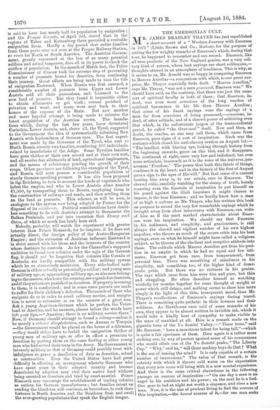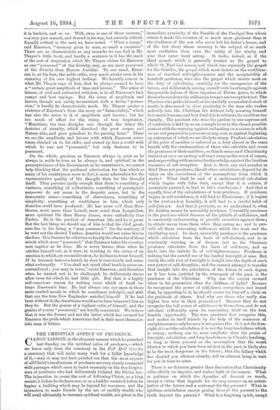THE EMERSONIAN CULT.
MR. JAMES BRADLEY THAYER has just republished a short account of a " Western Journey with Emerson in 1871 " (Little, Brown and Co., Boston), for the purpose of
setting the few weighty remarks of Emerson's which, during that tour, he happened to remember and can record. Emerson, like
all true products of the New England genius, was a very soli- tary kind of person, whose best sayings are short soliloquies,— thoughts uttered in an atmosphere of loneliness. This is why, as it seems to us, Mr. Arnold was so happy in comparing Emerson to Marcus Aurelius—a comparison with which, to our great sur- prise, Mr. Thayer especially finds fault. " Marcus Aurelius," says Mr. Thayer, " was not a man possessed, Emerson was." We should have said, on the contrary, that there was just the same sort of spiritual faculty in both of them ; that Emerson, in- deed, was even more conscious of the long reaches of spiritual barrenness in his life than Marcus Aurelius ; that some of his finest sayings were the sayings of a man far from conscious of being possessed,—conscious, in- deed, of utter solitude, and of a shrewd power of criticising even that which, in the unfortunate jargon of the transcendental period, he called " the Over-soul " itself. Now and then, no doubt, the oracles, as one may call them, which came from Emerson, gave signs of a sort of inspiration. Such was the sentence which closed his anti-slavery oration on August 1st :— " The intellect with blazing eye, looking through history from the beginning onwards, gazes on this blot, and it disappears. The sentiment of right, once very low and indistinct, but ever more articulate, inasmuch as it is the voice of the universe, pro- nounces Freedom.' The power that built this fabric of things, confirms it in the heart, and in the history of the first of August gave a sign to the ages of His will." But that sense of a current bearing him away is, to our minds, rare in Emerson. The shrewd critic, carefully watching for the stamp of truth, keenly scanning even the fountain of inspiration to put himself on his guard against the illicit impulses it might chance to impose, is the true Emerson ; and we hardly know how a man of so high a culture as Mr. Thayer, who has written this book on purpose to record the very few remarkable sayings which he brought away from close intercourse with Emerson, can write of him as if the most marked characteristic about Emer- son were his inspiration. We should say that Emerson in his nobleness, and simplicity, and graciousness, is still always the shrewd and vigilant watcher of his own highest impulses, who throws as much of the severe critic into his best sayings, even on what he himself might have called a religions subject, as he throws of the obedient and receptive attitude into them. The solitude which Marcus Aurelius got from his posi- tion in an empire in which be had no equal and few inti- mates, Emerson got from race, from temperament, from personal bias. There was something of stateliness in his simplicity, and something, too, of the higher End of demo- cratic pride. But there was no richness in his genius. The rays which came from him were fine and pure, but thin and straggling. He often describes himself as watching wistfully for months together for some thought of weight or power which still delays, and nothing seems to show him more simply in the light of this thin, transparent mood, than Mr. Thayer's recollections of Emerson's sayings during travel. There is something quite pathetic in their fewness and their mildness. As Hawthorne once said of some remarks of his own, they appear to be almost written in invisible ink, which it would take a kindly heat of sympathy to make visible to the mass of mankind at all. Here is a remark made on the gigantic trees of the Yo Semite Valley :—" These trees," said Mr. Emerson, " have a monstrous talent for being tall,"—which is quite a fair specimen of them. Here again is a rather more striking one, by way of protest against some of his companions who would climb one of the Yo Semite peaks, "The Liberty Cap." " Why," said he, " will these madcap boys do that ? What is the use of teasing the mind? It is only capable of a certain number of impressions." The value of that remark, is the sobriety with which it throws cold water on the expectation that every new scene will bring with it a new mental experience. And there is the same critical shrewdness in the following passage on sources of inspiration :—" On one day a man is an angel in his ambition and his power; on the next he is a fool. One goes to bed at night not worth a sixpence, and rises a new man. Now, it is the aim of prudent living to find the sources of this inspiration,—the honest sources of it,—for one man seeks
it in hashish, and so on. Well, sleep is one of these sources," —a very just remark, and shrewd in its way, but entirely critical.
Equally critical is the next we have noted. " What a range," said Emerson, " memory gives to man, so small a creature." These are as characteristic as any remarks we can find in Mr. Thayer's little book, and hardly a sentence in it has the mark of the sort of inspiration which Mr. Thayer claims for Emerson as one " possessed " of the divinity, nay, as one more possessed of the divinity than Marcus Aurelius. To our mind, Emer- son is, at his best, the noble critic, very much awake even in his scanning of his own highest feelings. We heartily concur in what Mr. Thayer says of him, that he always seemed to have a " certain great amplitude of time and leisure." The sense of leisure, of cool and unhurried criticism, is in all Emerson's best essays and best sayings. But the sense of amplitude and leisure, though not surely inconsistent with a divine " posses- sion," is hardly its characteristic mark. Mr. Thayer quotes a sentence of Emerson's from the essay on " Immortality," which has also the sense in it of amplitude and leisure ; but far too much of effort for the stamp of true inspiration. "Meantime, the true disciples saw through the letter the doctrine of eternity, which dissolved the poor corpse and Nature also, and gave grandeur to the passing hour." There we sea the amplitude and leisure with which Emerson some- times climbed on to his stilts, and craned up into a world with which he was not "possessed," but only desirous to be possessed.
On the whole, gracious as Emerson always is, pure as he always is, noble in tone as he always is, and spiritual in the peremptoriness of his discernment as he sometimes is, we cannot help thinking that the profound admiration for him which so many of his countrymen seem to feel, is more admiration for the representative quality of the thought than for the thought itself. They perceive justly enough that there is something of vastness, something of solitariness, something of peremptori- ness—we do not mean in the despotic sense, but in the democratic sense— something of shrewdness, something of simplicity, something of wistfulness in him, which only America could have produced. He has more will than Haw- thorne, more mass than Lowell, more mind than Longfellow, more spiritual life than Henry James, more catholicity than Parker. He is the, product of American life, and he is great. But the last thing we should say of him is that his chief great- ness lies in his being a "man possessed." On the contrary, if he were not the shrewd Yankee, America would not value him as she does. It is because he criticises so keenly the character of those minds which were " possessed," that Emerson takes his country- men captive as he does. He is never keener than when he catches himself out, as it were, in trusting to the swing of an emotion to which, on reconsideration, he declines to trust himself. If he becomes transcendental, he does it consciously and some- what awkwardly. " Yon shall not speak ideal truth in prose un- contradicted ; you may in verse," wrote Emerson ; and therefore when he wanted not to be challenged, he deliberately strove after verse for which he had little gift. But that is a highly self-conscious reason for writing verse which of itself be- trays Emerson's bias. He had always one eye open in those more exalted moods in which he sometimes indulged, and with that eye the true New Englander watched himself. If he had been without it, the Americans would never have treasured him as they do. But the genius of a vigilant critic of himself, and the genius of a man " possessed," are hardly consistent. We believe that it was the former and not the latter which has secured for Emerson the pride which Americans feel in their most character- istic man of letters.



































 Previous page
Previous page